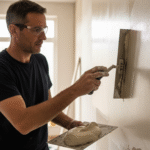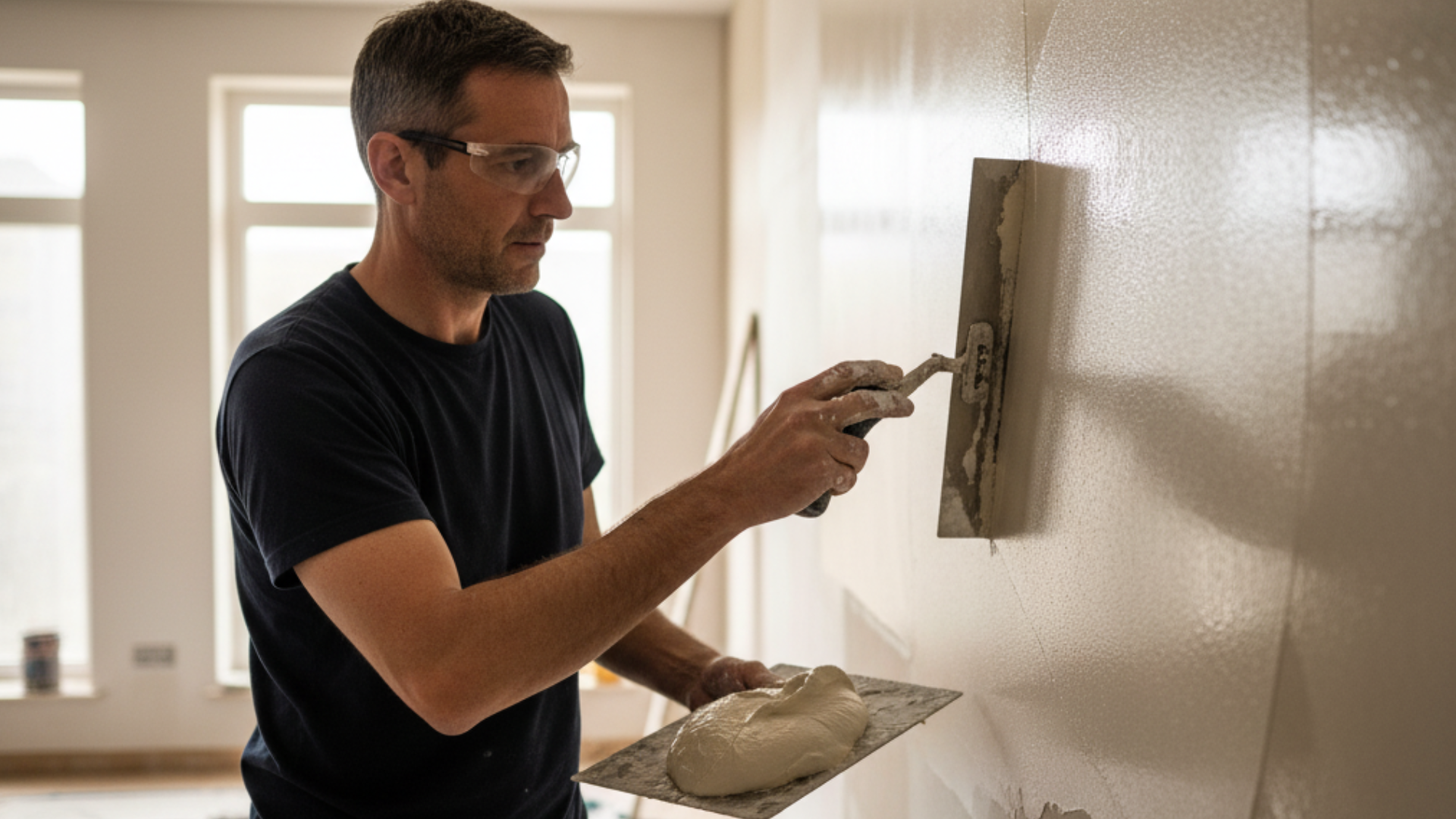How to Hire a Venetian Plaster Contractor in Toronto [MUST-KNOW TIPS]
By: Marcrete
If you’re looking to elevate your space with a luxurious, handcrafted finish, then using Venetian plaster is a bold and beautiful choice.
But if you’re in the Toronto/GTA area and want a flawless result, hiring the right contractor is key. The finish is delicate, the technique specialised, and the uptime and quality matter.
Let’s get right into it
1. Understand What Venetian Plaster Is (And Why It Matters)
Venetian plaster is more than just paint with texture: it’s a multi-layer, hand-applied lime or marble-dust based finish that offers depth, a lustrous sheen, and durability. It’s not a standard painting job.
Its proper application demands a skilled artisan. Knowing this helps you appreciate why you shouldn’t simply go with the lowest bid or a generic painter.
2. Look for Experience & Portfolio in Toronto/GTA
When choosing a contractor in Toronto, you’ll want someone who has done Venetian plaster work (not just drywall or standard textured finishes).
Check their portfolio for real examples in the GTA: bespoke feature walls, fireplace surrounds, luxury condos, etc. Guides emphasize that this finish demands proper technique.
Ask: “Have you completed this kind of finish in a Toronto home or condo? Can you show before/after photos?”
3. Check Credentials, Reviews & Local Reputation
Since this is a premium finish, you’ll want a contractor with:
- good online reviews (Google, Houzz, etc) in the Toronto area
- references you can speak to
- proof of business licence/insurance
- clarity about the products they’ll use
Ensure you’re comfortable with their communication, timelines and how they handle surprises.
4. Request a Detailed Quote Including Surface Preparation
Unlike standard paint, Venetian plaster involves more surface preparation, layering and burnishing.
As one guide notes, you should get a detailed quote that outlines materials, labour, surface repairs, number of coats, and any top-coating or sealing needed.
Ask: “What’s included in the quote for surface prep and finishing? Are there hidden extra steps if the wall is uneven or damaged?”
5. Confirm Materials & Finishes Used
High-quality Venetian plaster uses proper materials — lime, marble dust, compatible sealers, and the right trowels and techniques. Poor materials = inferior finish and durability.
Ask: “What brand of plaster do you use? Do you apply a sealer? How is it maintained, especially in high-humidity zones like bathrooms?”

6. Timing & Project Phase Considerations
In a renovation scenario in Toronto, timing matters: you’ll want the plaster applied when all other trades (drywall, electrical, plumbing) are done, and the space is clean and dry.
One source emphasises this finish should come late in the process.
Ask: “When will you schedule the plaster work relative to other trades? How do you protect the wall before application?”
7. Ask About Maintenance, Warranty & Durability
One of the benefits of properly applied Venetian plaster is its long-term durability and resistance to mould/mildew (especially when sealed for humid zones).
Ask: “What kind of maintenance is required? Do you provide a warranty on your workmanship? What happens if the finish cracks or shows wear?”
8. Understand Cost and Value in Toronto Market
Venetian plaster can cost in the range of $10 to $25 per square foot or higher depending on complexity.
Make sure you compare apples-to-apples: surface preparation, number of coats, design complexity. A “cheap” finish may compromise on longevity and look.
9. Ask For A Written Agreement With Scope & Timeline
Before work begins: get a contract that outlines scope, start/finish dates, payment schedule, how change orders will be handled, and cleanup responsibilities.
Check: “What happens if the substrate is worse than expected?” “How will delays be handled?”
10. Communicate Style, Colour & Finish Expectations Clearly
Venetian plaster ends can appear quite different depending on lighting, trowel technique, and finish sheen. They can range from matte to high-gloss. Ensure you review physical samples or small test areas.
Ask: “Can I see photos of finishes under similar lighting to my space? Will you apply a mock panel so I can approve the effect?”
11. Final Walk-through & Handover
After completion, inspect the walls in natural and artificial light, look for consistent sheen, even texture, no trowel marks, proper edges and transitions. Confirm that the job site is cleaned up, dust removed, and any product information or maintenance instructions are provided.
Conclusion
Hiring a Venetian plaster contractor in Toronto is about finding that rare blend of artisan skill + reliable project management + quality materials.
Follow the above checklist, ask the right questions, and you’ll significantly increase the odds of a stunning finish that lasts.
If you have any questions about our article “How to Hire a Venetian Plaster Contractor in Toronto [MUST-KNOW TIPS]” or looking for a professional venetian plaster contractor, contact us at info@marcrete.ca or connect with us on Google My Business.
FAQs About Hiring The Right Venetian Plaster Contractor In Toronto
1. How do I know if a contractor truly specializes in Venetian plaster?
Ask to see a portfolio of completed Venetian plaster projects — not just drywall or paint jobs. True specialists can show close-up photos or sample boards demonstrating various finishes (matte, polished, marmorino, etc.). Also, check if they use authentic lime-based materials rather than acrylic imitations.
2. What should I ask during the consultation?
Ask questions like:
- “What type of plaster material do you use?”
- “How many layers do you apply?”
- “Can you provide client references in the Toronto area?”
- “What kind of maintenance will this finish need?”
These help gauge both skill and transparency.
3. How much does Venetian plaster cost in Toronto?
Pricing in the GTA generally ranges from $10 – $25 per square foot, depending on complexity, texture, and number of coats. High-gloss polished finishes and artistic patterns cost more due to added labour and material quality.
4. Are there any certifications or training I should look for?
While Canada doesn’t require formal licensing specifically for Venetian plaster, look for contractors who’ve trained under Italian manufacturers or have credentials from plaster schools or workshops. Membership in decorative finishing associations or guilds also signals expertise.
5. Should I choose lime-based or synthetic Venetian plaster?
Lime-based plasters are natural, breathable, and environmentally friendly, ideal for durability and authentic appearance. Synthetic or acrylic plasters can be cheaper but may lack the same texture and longevity. Ask your contractor which product they recommend and why.
6. How long does a Venetian plaster project take?
A typical feature wall may take 2–4 days, while full rooms or commercial projects can stretch to a week or more. Each layer needs adequate drying and burnishing time. A professional contractor will provide a clear timeline based on surface prep, size, and finish type.
7. Can Venetian plaster be applied in bathrooms or humid areas?
Yes — but only if the contractor uses proper sealing and waterproof lime plaster formulations. Always ask if the product is suitable for high-humidity environments, and confirm that a protective topcoat or wax will be applied to resist moisture.
8. What red flags should I watch out for when hiring?
Avoid contractors who:
- Can’t show proof of similar past projects
- Provide vague quotes without material details
- Push for large upfront deposits
- Don’t carry insurance or a business licence
Professionalism and transparency are as crucial as skill.
9. How do I maintain a Venetian plaster wall after installation?
Most finishes require little maintenance — just dust gently with a soft cloth. Avoid harsh cleaners or abrasive sponges. If sealed properly, Venetian plaster resists mould and stains. For touch-ups, call the original contractor so they can match the texture and tone.
10. Why hire a local Toronto contractor instead of an out-of-town service?
Local contractors understand Toronto’s climate, humidity levels, and building materials, which directly affect how plaster cures. They also provide easier communication, faster site visits, and stronger accountability if touch-ups or warranty work are needed.







